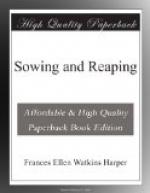“Yes Paul; I remember your mother. I wish! Oh well there is no use wishing. But if all Christians were like her, I would have more faith in their religion.”
“But John the failure of others is no excuse for our own derelictions.”
“Well, I suppose not. It is said, the way Jerusalem was kept clean, every man swept before his own door. And so you will not engage in the business?”
“No John, no money I would earn would be the least inducement.”
“How foolish,” said John Anderson to himself as they parted. “There is a young man who might succeed splendidly if he would only give up some of his old fashioned notions, and launch out into life as if he had some common sense. If business remains as it is, I think he will find out before long that he has got to shut his eyes and swallow down a great many things he don’t like.”
After the refusal of Paul Clifford, John soon found a young man of facile conscience who was willing to join with him in a conspiracy of sin against the peace, happiness and welfare of the community. And he spared neither pains nor expense to make his saloon attractive to what he called, “the young bloods of the city,” and by these he meant young men whose parents were wealthy, and whose sons had more leisure and spending money than was good for them. He succeeded in fitting up a magnificent palace of sin. Night after night till morning flashed the orient, eager and anxious men sat over the gaming table watching the turn of a card, or the throw of a dice. Sparkling champaign, or ruby-tinted wine were served in beautiful and costly glasses. Rich divans and easy chairs invited weary men to seek repose from unnatural excitement. Occasionally women entered that saloon, but they were women not as God had made them, but as sin had debased them. Women whose costly jewels and magnificent robes were the livery of sin, the outside garnishing of moral death; the flush upon whose cheek, was not the flush of happiness, and the light in their eyes was not the sparkle of innocent joy,—women whose laughter was sadder than their tears, and who were dead while they lived.




